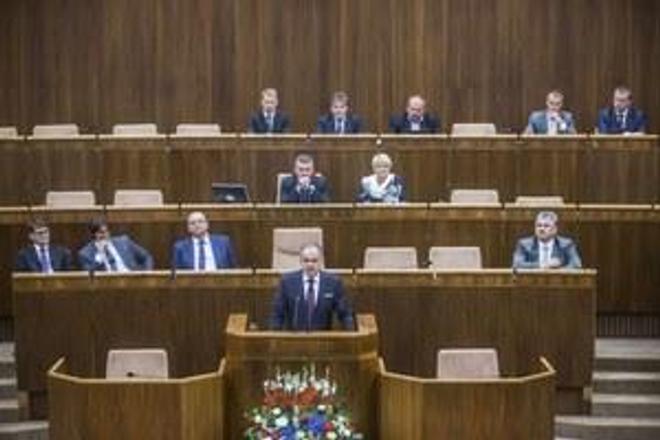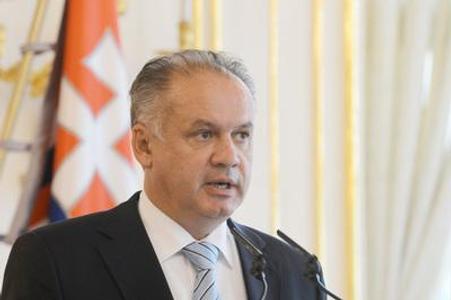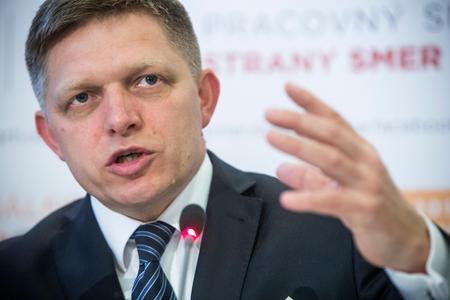Kiska's speech came at his own request, and on the heels of earlier criticisms that Slovak politicians are abusing the migration crisis as an issue before the 2016 parliamentary elections.
Slovakia is able to receive several thousand refugees, the president said in front of MPs. He has been claiming the country has the capacity to open itself to more refugees ever since the migration crisis developed as an issue in Slovakia this summer. This contrasts to statements by Prime Minister Robert Fico and his government, who have been critical of Muslim migrants in particular.
Wrong about quotas
While government politicians have devoted energy to publicly opposing the European Union’s system of mandatory quotas for redistribution of migrants across the member states, which Fico plans to contest at the European Court of Justice, Kiska claimed that with regard to the quotas, the government has “lost its battle”.
In most of Europe, unlike in Slovakia, the bureaucratic term ‘quotas’ did not lose its humane and humanitarian aspect, according to Kiska.
“Most of Europe and its political leaders can still see what is behind that unbecoming term ‘quotas’ - a person; and that the quota numbers mean human beings,” he said. “I think we have underestimated this humanitarian aspect, this emotion.”
Slovakia also failed to understand the meaning of quotas as an expression of solidarity among European countries, a signal from one member state to another, and a signal for all the citizens across the European Union.
Kaliňák feels sorry
Fico and Lajčák were already en route to an official visit to Cuba as Kiska criticised Slovakia’s foreign policy in the parliament. Prior to his departure, Fico issued a statement for the press saying that the difference in opinion between the cabinet and the president is clear and talking the talk is not walking the walk.
“The full responsibility for migration policy and for what will ensue rests with the government,” Fico said.
Interior Minister Robert Kaliňák who sat in the parliament during Kiska’s speech, regrets that Kiska does not endorse Slovakia’s position towards the quotas and said Kiska got some of the facts in his speech wrong.
“Perhaps people who prepared his speech, did not tell him some things,” Kaliňák said as quoted by the SITA newswire.
Kaliňák in his reaction pointed out that Hungary now has less than 2,000 refugees while the European Commision wants to redistribute 54,000 refugees located in Hungary.
“Solidarity cannot work like a forward mechanism, that some refugees might come and we will redistribute them,” Kaliňák said. “We have known for two years that migration wave was rising. It wasn’t sudden, but the problem was not being addressed.”
Fico further addressed the question of quotas and his government’s rejection of them after the cabinet’s session on October 7.
“We are for solidarity, but that can be shown in ways other than just by voting for nonsensical quotas,” Fico said as quoted by the TASR newswire.
Fico pointed out Slovakia’s contribution of€20 million for the protection of EU’s external borders sa one way of showing solidarity to European partners. The government is also pondering Slovakia’s participation in the so-called hotspots for migrants, he said.
Slovakia at the heart of EU
Kiska, however, maintains that accepting refugees and complying with EU’s quotas plan is a powerful gesture that “no financial or other offer can replace in the given moment”.
It is of vital importance to Slovakia to have real friends and allies who can have trust in each other, according to Kiska.
Slovakia needs to work to “erase the unfavourable impression” that the country’s representation made amid the developing migration crisis among most of Europe, as soon as possible, “to get out of the lonely position that we have now found ourselves in”, Kiska said.
Ambitions in local politics should not overshadow the interests of our country, Kiska told MPs.
“Questioning the place and the interests of Slovakia, campaigns for a change in Slovakia’s direction that have appeared, or even political extremism will feel even more encouraged if their aims and arguments are given any credit,” Kiska said.
Kiska maintains that politicians should do more to make sure citizens are well-informed about quotas.
“This could be acceptable even for most our citizens, if we explained such a decision in a peaceful, precise manner and jointly,” he said. “It would mean no threat for Slovakia, and it would have no impact on a better or worse life for people in Slovakia.”
NATO is not a spare overcoat
Kiska also mentioned the developments in Ukraine as he listed Slovakia’s vital interests, particularly the Nord Stream 2 project that “goes against Slovakia’s and Europe’s interests”.
“I would be happier if Slovakia was in a different position in the EU these days and months so that we could act with more power,” Kiska said in parliament, adding that Slovakia should listen and understand arguments of those partners whose attention and support it seeks.
Kiska also labelled it unwise to underestimate the weak public support of Slovakia’s NATO membership.
“It is short-sighted to nourish the impression among the public that our security guarantees are only some spare heavy overcoat that we just put on if an extremely harsh winter arrives - and because such a winter is not coming to Slovakia right now, we do not need to talk about it,” he said.




